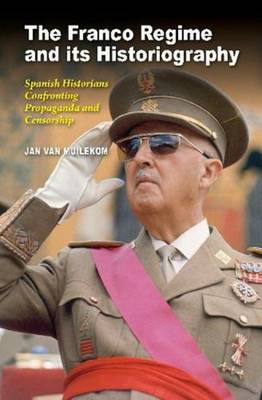
- Afhalen na 1 uur in een winkel met voorraad
- Gratis thuislevering in België vanaf € 30
- Ruim aanbod met 7 miljoen producten
- Afhalen na 1 uur in een winkel met voorraad
- Gratis thuislevering in België vanaf € 30
- Ruim aanbod met 7 miljoen producten
Zoeken
The Franco Regime and Its Historiography
Spanish Historians Confronting Propaganda and Censorship
Jan Van Muilekom
€ 254,45
+ 508 punten
Omschrijving
For two decades after the civil war the Franco regime applied systematic historical propaganda and imposed relentless repression of history professionals. In the 1960s and 1970s, however, the balance shifted from all-pervading propaganda to structural but flexible censorship. Gradually and reluctantly, the regime had to give back the initiative for explaining the recent past to where it belonged: to the professional historians, but not without oversee and livelihood threat. In its efforts to keep control, the regime could count on historians who were willing to censor their more adventurous colleagues. But the outcome of this process was biased and uncertain. The main issue was always whether an author could be considered a friend of the regime. Personal interventions by Franco himself regularly played a decisive role. Historians fully loyal to the regime and its aims were published without difficulty; others took a reformist path, albeit without endangering the dominant interpretation that favoured the tropes of inevitability and positive consequences of Franco's rebellion. Reformist historians avoided criticism of the personal integrity of the dictator and the army, and did not address the issue of systematically planned terror in Franco's National Zone during the Civil War. Historians who dared to embrace these topics were condemned to write from abroad. Historical works dealing with the Spanish Civil War (1936-1939) have been regularly studied in-depth. Dutch historian Jan van Muilekom provides a wider perspective by viewing the Franco historiography from the time of the preceding Second Republic (1931-1936). His analysis recognizes the crucial 1939-1952 period where Franco consolidated his seizure of power. The research is based on a wealth of published censored books, unpublished manuscripts, censorship archives and historical propaganda material. The book is an important complement to earlier studies that mainly dealt with the regimes dealing with the press, the film industry and literature. Over a span of four decades, Franco never lost his grip on how recent Spanish history should be read. Exploring the historiography of the regime provides multiple insights into the links between authoritarianism and censorship.
Specificaties
Betrokkenen
- Auteur(s):
- Uitgeverij:
Inhoud
- Aantal bladzijden:
- 340
- Taal:
- Engels
- Reeks:
Eigenschappen
- Productcode (EAN):
- 9781789761023
- Verschijningsdatum:
- 19/07/2021
- Uitvoering:
- Hardcover
- Formaat:
- Genaaid
- Afmetingen:
- 156 mm x 234 mm
- Gewicht:
- 571 g

Alleen bij Standaard Boekhandel
+ 508 punten op je klantenkaart van Standaard Boekhandel
Beoordelingen
We publiceren alleen reviews die voldoen aan de voorwaarden voor reviews. Bekijk onze voorwaarden voor reviews.











